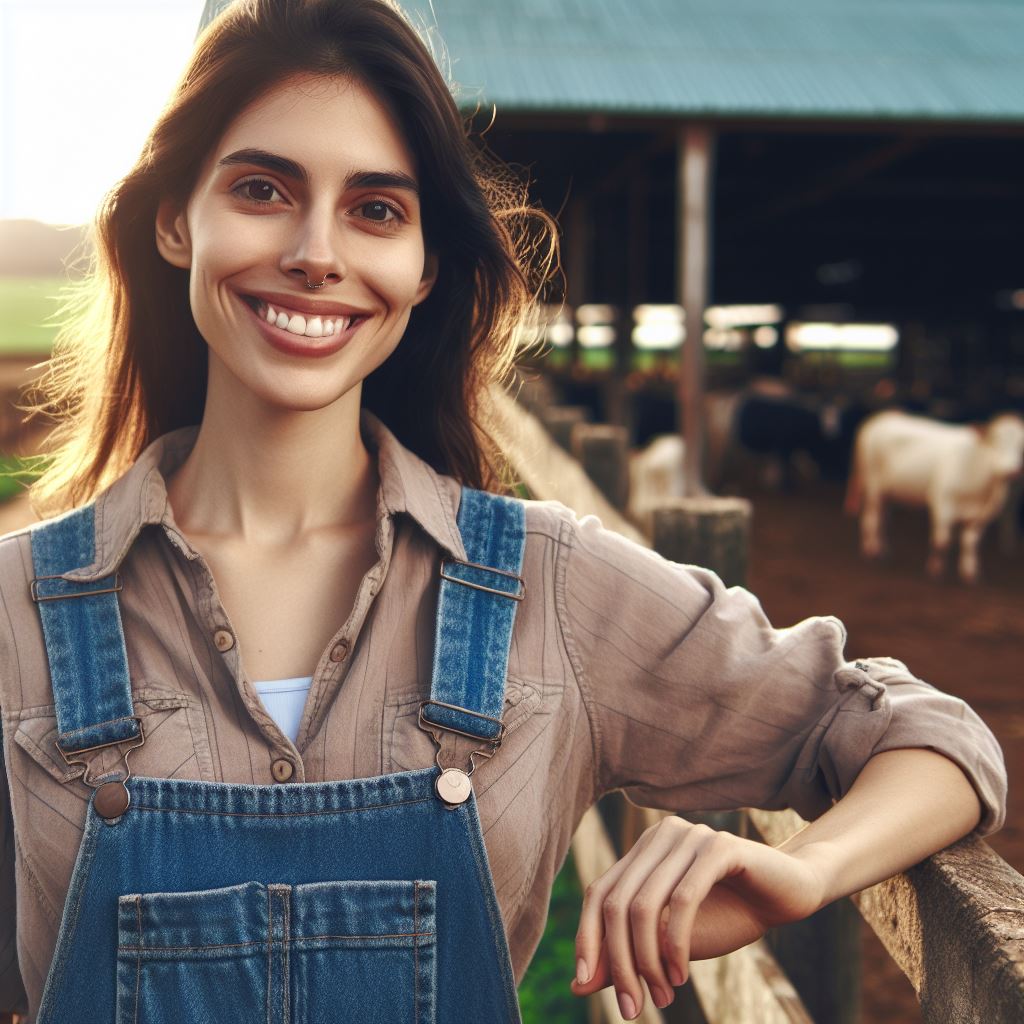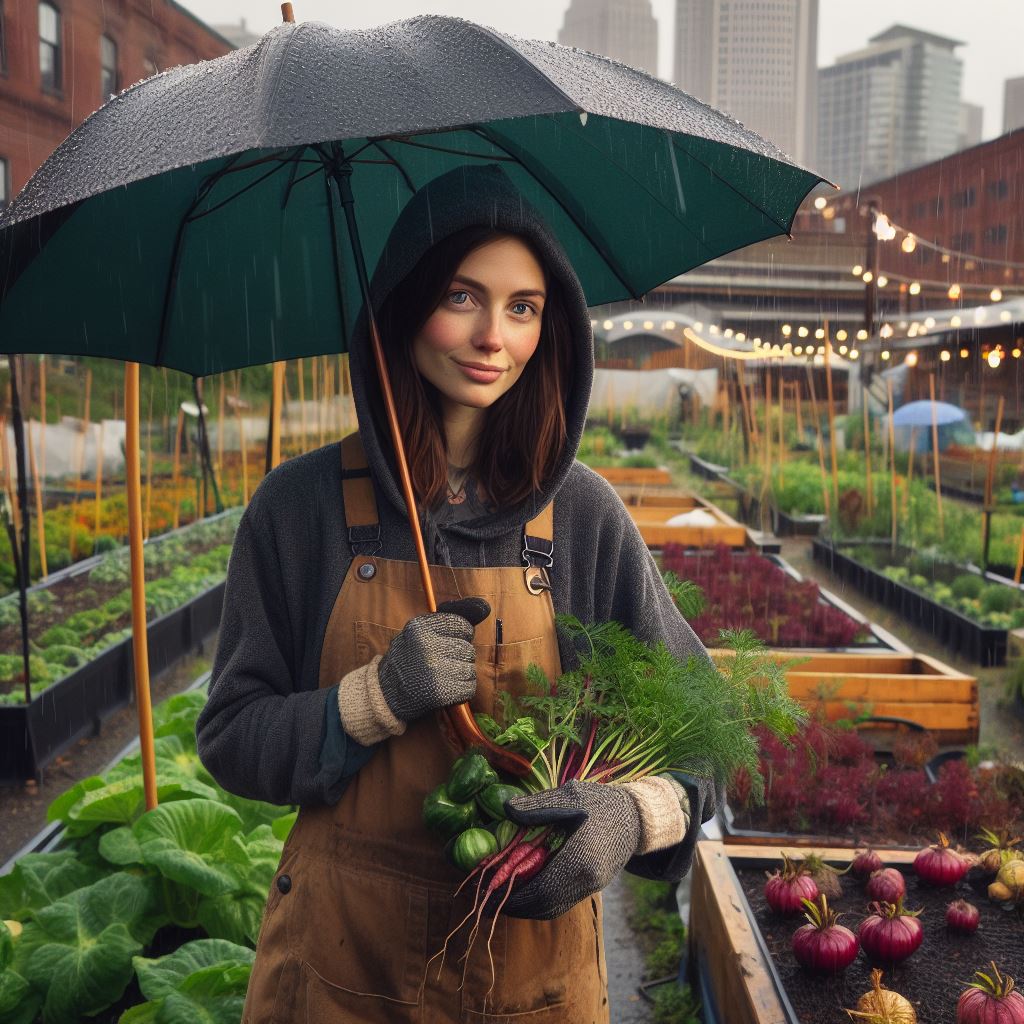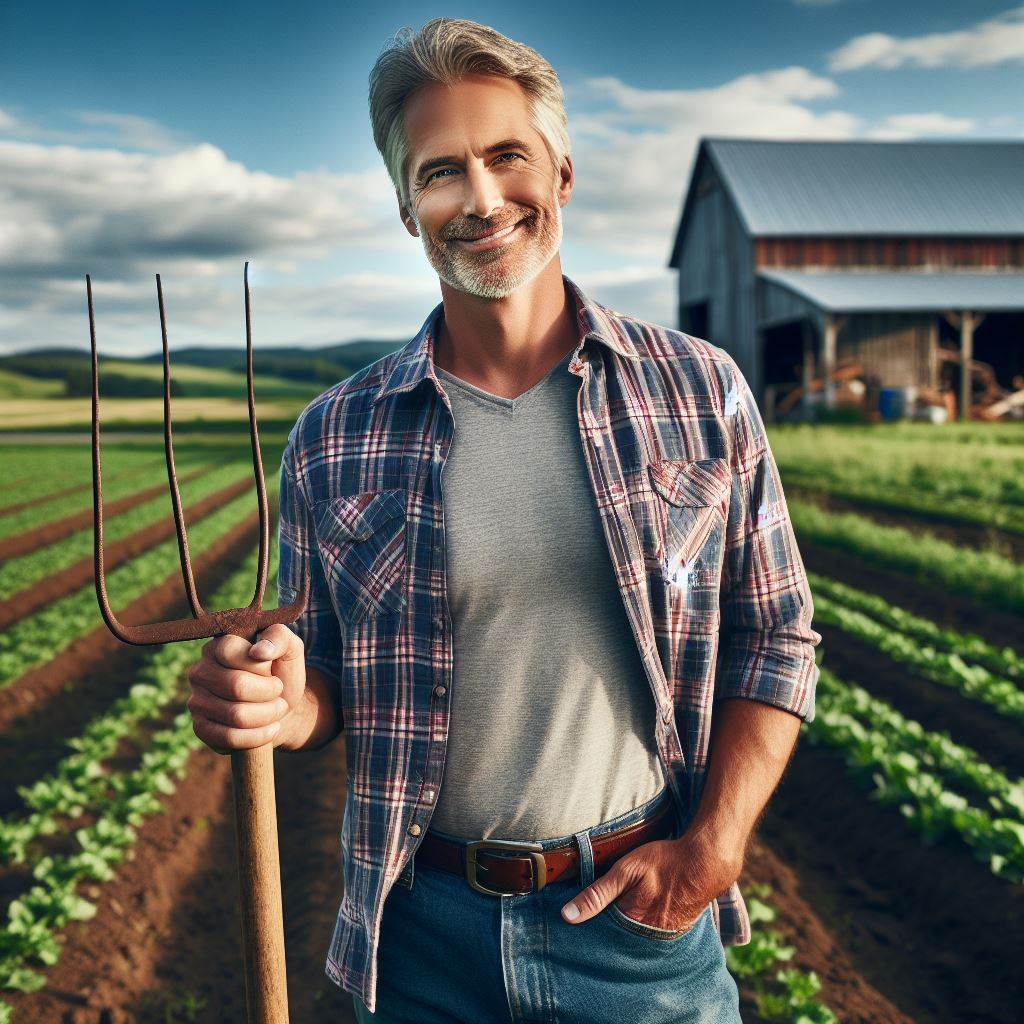Introduction
Women in overalls on family farms exemplify resilience and dedication in agricultural landscapes.
Family farms serve as the backbone of local economies, preserving tradition and fostering community connections.
Family farms hold a special place in the agricultural tapestry, with women playing pivotal roles in their success.
In overalls, they embody the spirit of hard work and determination, tending to crops, caring for livestock, and managing the intricacies of farm life.
The significance of family farms transcends mere agricultural production.
They serve as hubs of sustainability, preserving the land for future generations.
Women, often overlooked in the narrative of farming, are instrumental in this endeavor. Their contributions, from planting seeds to nurturing relationships with consumers, are invaluable.
Moreover, family farms foster a deep sense of community.
They provide fresh, locally sourced produce, strengthening ties between farmers and consumers.
Women, with their nurturing instincts and attention to detail, enhance this connection, ensuring that the fruits of their labor reach table with love and care.
In the following chapters, we’ll delve deeper into the multifaceted roles of women in overalls on family farms, exploring their challenges, triumphs, and the enduring legacy they create on the agricultural landscape.
Historical Perspective: Women in Agriculture
Role of Women in Farming Throughout History
Women have played a crucial role in agriculture since ancient times. They were involved in various farming tasks such as planting, harvesting, and tending to animals.
Despite their integral contributions, women’s roles in agriculture were often overlooked and undervalued. They were seen as supporting actors rather than equal partners in farm management.
Women’s labor was essential for the survival and prosperity of family farms. They worked alongside men, enduring long hours and performing physically demanding tasks.
Women’s involvement in farming was deeply rooted in the need for food security and sustenance. They displayed resilience and resourcefulness, adapting to challenging environments and crop failures.
Significant Contributions Made by Women in the Agricultural Sector
Women have made substantial contributions to agricultural innovation and development. They have contributed to advancements in seed selection, crop rotation techniques, and animal husbandry.
Some notable women scientists and researchers have revolutionized farming practices. Examples include Rachel Carson, who raised awareness about the harmful effects of pesticides, and Temple Grandin, who improved animal welfare in livestock handling.
Women’s contributions have also extended to farm management, marketing, and entrepreneurship.
They have started successful farm businesses, co-operatives, and agricultural organizations. Women have played vital roles in sustainable and organic farming movements.
They have championed environmentally friendly practices and promoted local food systems.
Challenges and Limitations Faced by Women in the Past
Women in agriculture have faced significant barriers and discrimination throughout history. Traditionally, women were denied access to education and training in agricultural sciences.
Transform Your Agribusiness
Unlock your farm's potential with expert advice tailored to your needs. Get actionable steps that drive real results.
Get StartedAgricultural extension programs and technical assistance often excluded them. Society undervalued women’s contributions, offering them limited recognition and compensation for their efforts.
Access to land, credit, and resources was disproportionately limited for women farmers. Gender norms and societal expectations confined women to specific roles within the agricultural sector.
Women struggled to break free from the perception that farming was solely a man’s domain. However, despite these challenges, women persisted and fought for their rightful place in agriculture.
Read: The Apple Orchard: Seasons of Hardship
The Modern Family Farm
The concept of a modern family farm
- A family manages and owns a modern family farm, which operates across generations in agriculture.
- It combines traditional farming practices with innovative technologies and sustainable methods.
- Family farms often focus on diversifying their products and adopting new farming techniques.
The changing roles and responsibilities of women in family farms
- Traditionally, women on family farms primarily performed household chores and cared for children.
- However, in recent years, women have taken on more active roles in managing farm operations.
- They contribute to decision-making processes, financial management, and marketing strategies.
- Women are increasingly recognized as key contributors to the success of family farms.
The diverse tasks performed by women on a family farm
- Women engage in various farming activities, such as planting, harvesting, and caring for livestock.
- They also manage farm finances, handle administrative tasks, and maintain farm equipment.
- Women may be responsible for marketing farm products, including managing farmers markets or online sales.
- Additionally, women play a vital role in maintaining farm sustainability and implementing environmental conservation practices.
Important role women play in managing and operating family farms
- Women’s involvement in family farming has significantly contributed to the economic and social sustainability of farms.
- They bring diverse skills and perspectives, contributing to efficient decision-making and problem-solving.
- Women’s contributions have led to increased profitability, improved farm productivity, and enhanced community engagement.
- Their active participation ensures the continuation and success of family farms for future generations.
By recognizing the vital role of women on family farms, society can truly appreciate their contributions and support their continued progress.
The modern family farm thrives because of the dedication and involvement of women, who have successfully balanced traditional family responsibilities with the complexities of modern agricultural practices.
As we move forward, it is crucial to empower and encourage women in rural areas to pursue careers in farming and provide them with equal opportunities for growth and success.
Together, we can build a more inclusive and sustainable future for family farms and rural communities.
Read: Cattle Trails: A Rancher Life and Work

Challenges Faced by Women in Overalls
The unique challenges women face while working on a family farm
- Physical demands: Women working on family farms often face physically demanding tasks such as heavy lifting and long hours of manual labor.
- Stereotypes and prejudices: Women in overalls might be seen as less capable or knowledgeable in the farming industry.
- Lack of recognition: Women’s contributions to the family farm are sometimes overlooked or undervalued.
- Gender-based expectations: Society often expects women to focus on domestic responsibilities instead of farm work.
- Limited access to resources: Women may struggle to access educational opportunities, financial support, and agricultural technology.
Gender-based stereotypes and societal expectations related to farming
- Male-dominated industry: Agriculture has been traditionally seen as a male-dominated industry, contributing to gender-based stereotypes.
- “Farmer’s wife” role: Women are often expected to be in supportive roles rather than taking leadership positions in farming.
- Assumptions about competence: Society may assume that women lack the skills and knowledge necessary to succeed in farming.
- Limited role models: The underrepresentation of women in prominent farming positions hinders breaking gender-based expectations.
The challenges of balancing family and farm duties
- The juggling act: Women in overalls often face the challenge of balancing the demands of running a family farm and fulfilling family obligations.
- Sacrificing personal time: Balancing farm and family responsibilities may leave little time for leisure and self-care.
- Double workload: Women often have to manage both farm duties and household chores, amplifying the already heavy workload.
The lack of recognition and support for women in agricultural leadership roles
- Underrepresentation in leadership: Women continue to be underrepresented in agricultural leadership positions.
- Glass ceiling effect: Women face barriers to advancing in their farming careers due to discriminatory practices and limited opportunities for growth.
- Lack of support networks: Women may struggle to access mentors and support systems to navigate the challenges they face in agricultural leadership roles.
- Limited access to funding and resources: Women may encounter difficulties in accessing capital, loans, and government support to expand their farming operations.
In summary, women in overalls on family farms face numerous challenges.
From physical demands to gender-based stereotypes and societal expectations, it is essential to acknowledge and address these issues.
Balancing family and farm duties can be overwhelming, and women often lack recognition and support in agricultural leadership roles.
By breaking down gender barriers, providing equal opportunities, and fostering supportive networks, women in overalls can thrive and contribute even more to the farming industry.
Read: From Seeds to Success: An Organic Farmer
Celebrating Women in Overalls
Inspiring stories of women who excel in farming
- Meet Mary, a third-generation farmer who turned her struggling family farm into a thriving business.
- Discover Sarah’s journey from the city to the countryside, where she found her true passion in farming.
- Learn about Emma, a single mother who overcame numerous obstacles to establish a successful organic farm.
Successful female farmers and their achievements
- Explore Laura’s innovative techniques that boosted her crop yields and earned her recognition in the industry.
- Celebrate Rachel’s organic farm, which earned her farm-to-table restaurant collaborations and national awards.
- Marvel at the growth and influence of Amanda’s farm, as she expanded her business to reach global markets.
Organizations or initiatives that support and promote women in agriculture
- The Women’s Agricultural Network provides resources and mentorship to empower women farmers.
- FarmHer is an organization that showcases women in agriculture through media and networking events.
- The National Women in Agriculture Association focuses on advocacy and policy changes for female farmers.
Readers to celebrate and uplift the accomplishments of women in overalls
- Share inspiring stories of women who have defied societal norms and achieved success in farming.
- Highlight the invaluable contributions of female farmers in sustaining local communities and the economy.
- Encourage readers to attend local farmer’s markets and support women-owned farming businesses.
- Urge readers to advocate for equal opportunities and recognition for women in the agricultural industry.
- Celebrate the strength, resilience, and dedication of women who work tirelessly on the family farm.
Read: Grape Expectations: A Vintner Journey
Find Out More: From Classroom to Field: Young Farmers’ Journey
Conclusion
In the heart of family farms, women in overalls embody resilience, dedication, and nurturing spirits.
Their significance reverberates through generations. Let’s honor their vital role in sustaining our agricultural heritage.
Appreciate and support these unsung heroines who toil alongside their loved ones, tending to crops and livestock.
Their hard work feeds nations and builds communities.
As we reflect on their contributions, let’s amplify their voices and advocate for gender equality in agriculture.
Together, we can break barriers and create opportunities for women in overalls.
The future holds promise as more women embrace farming as a profession.
With determination and passion, they’ll continue shaping the landscape of agriculture.
In fields adorned with golden crops and under vast skies, women in overalls stand tall, embodying the spirit of resilience.
Let’s celebrate their unwavering commitment and ensure their place in the bright future of farming.




